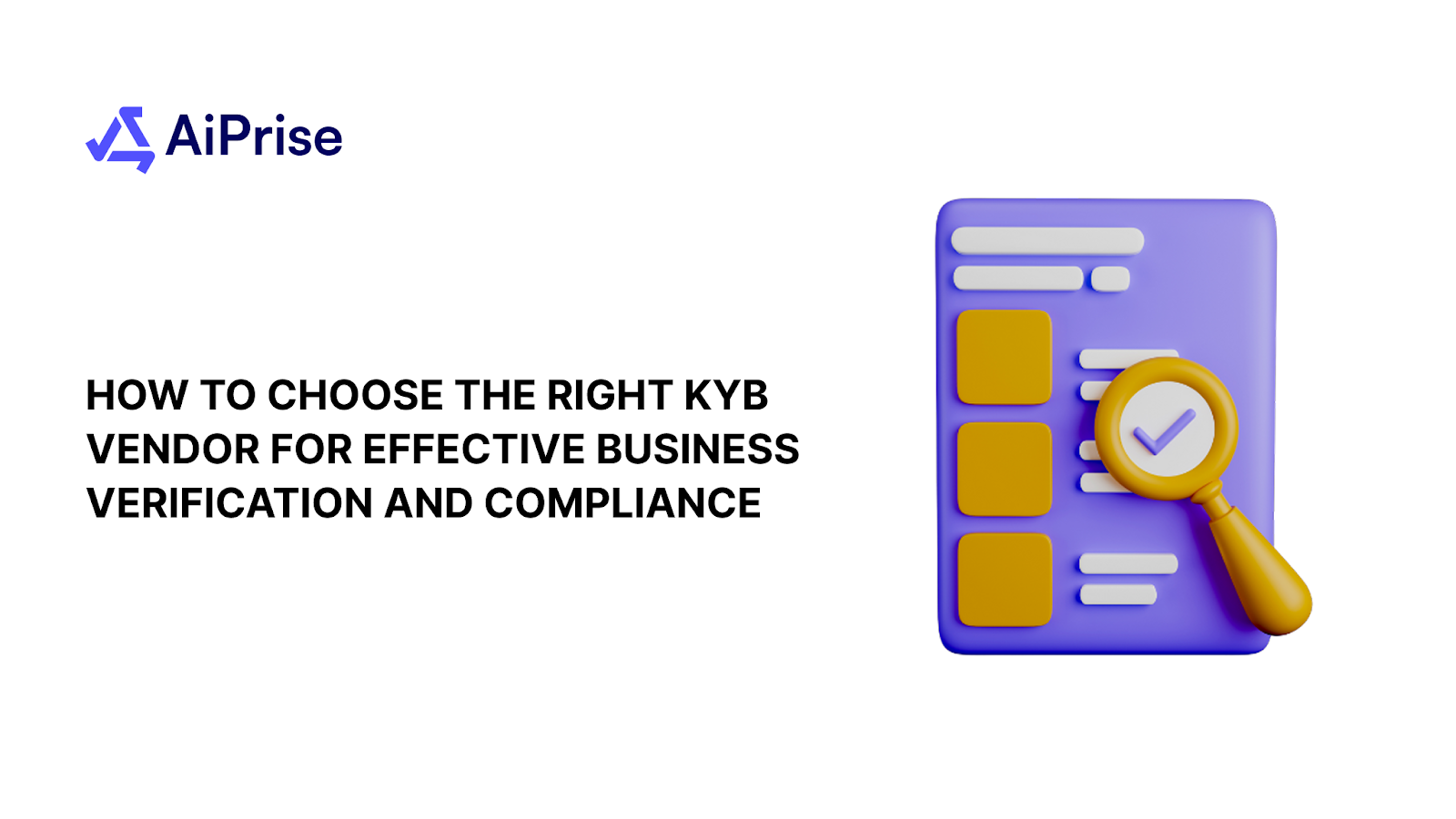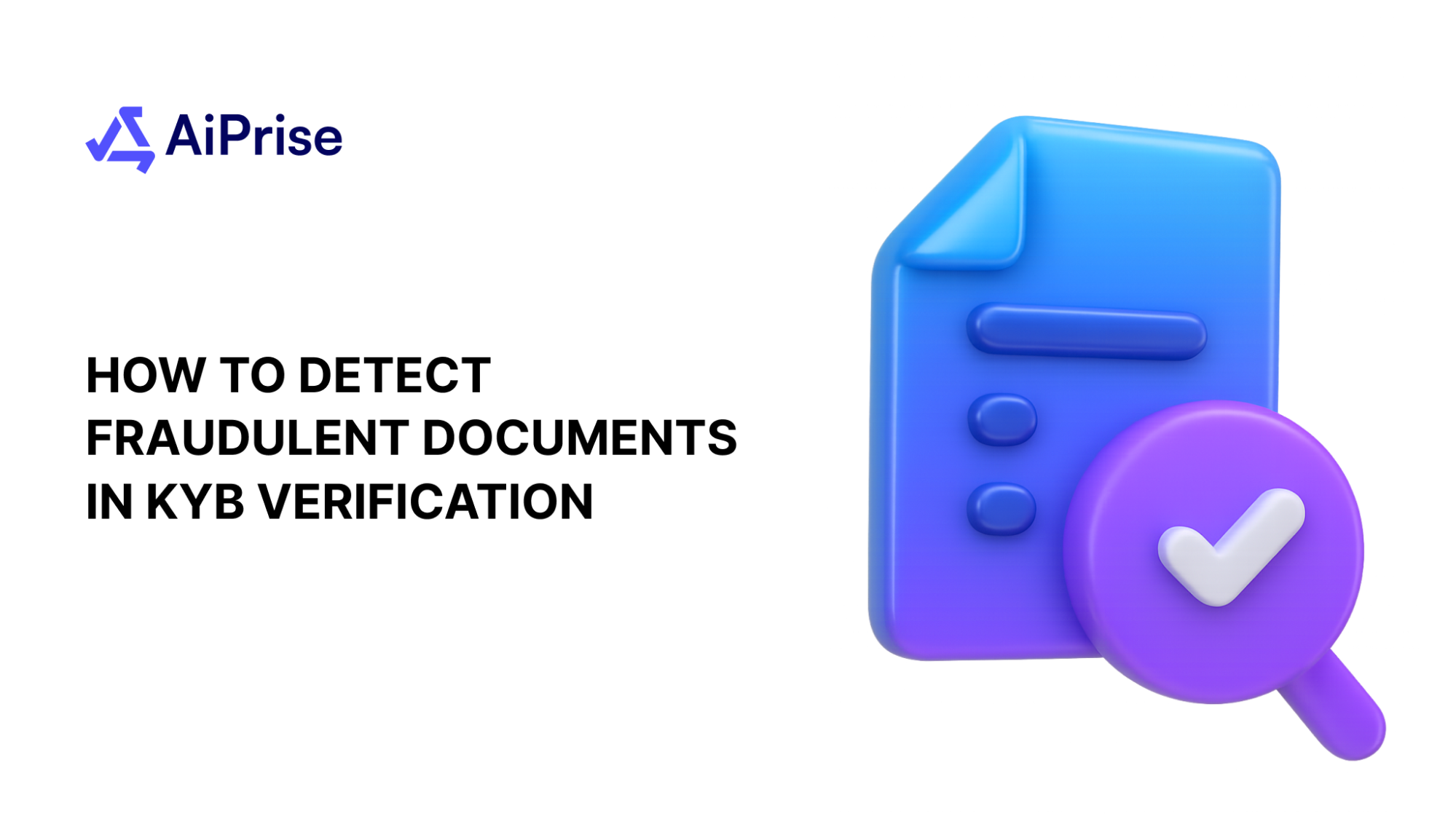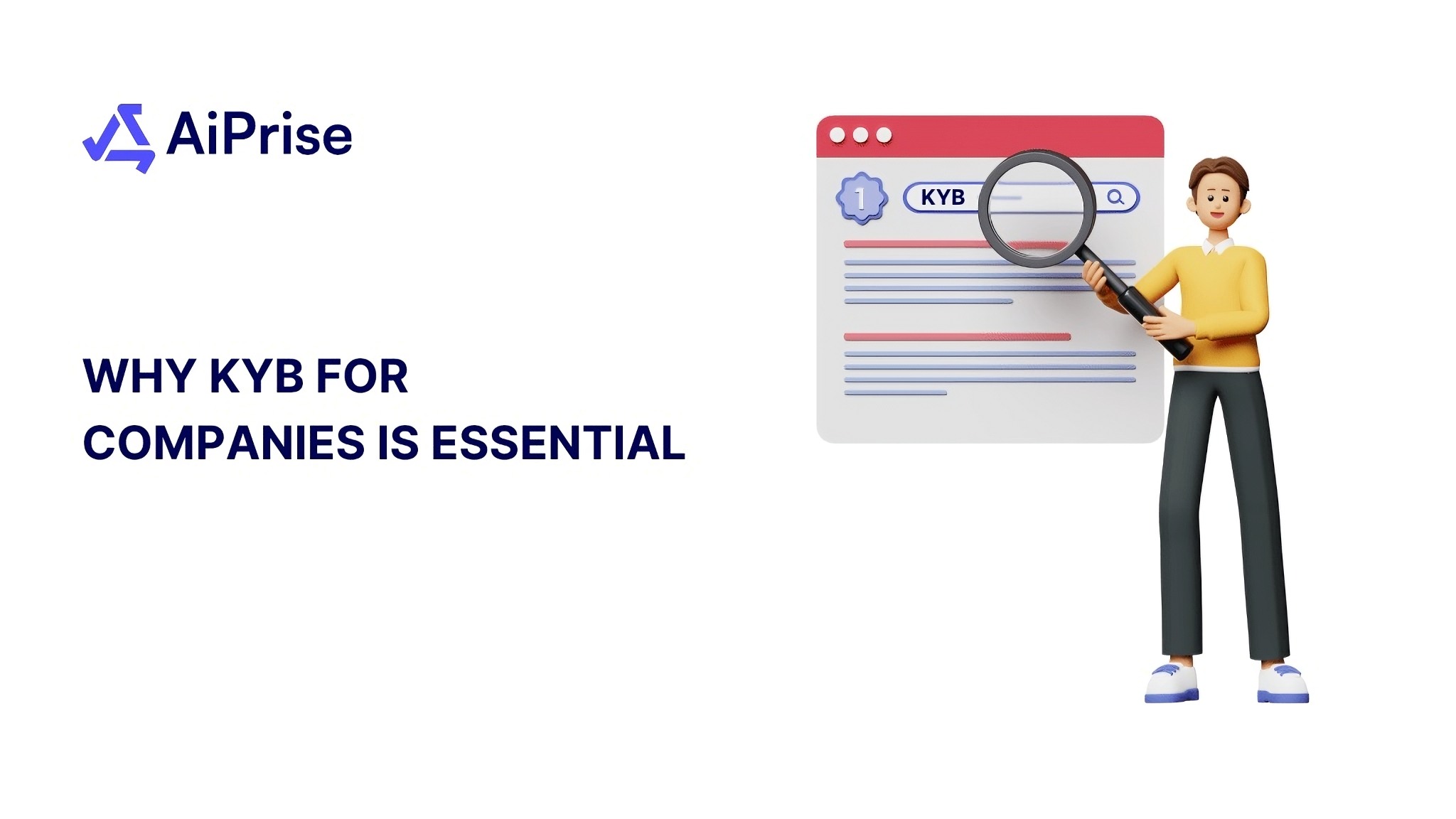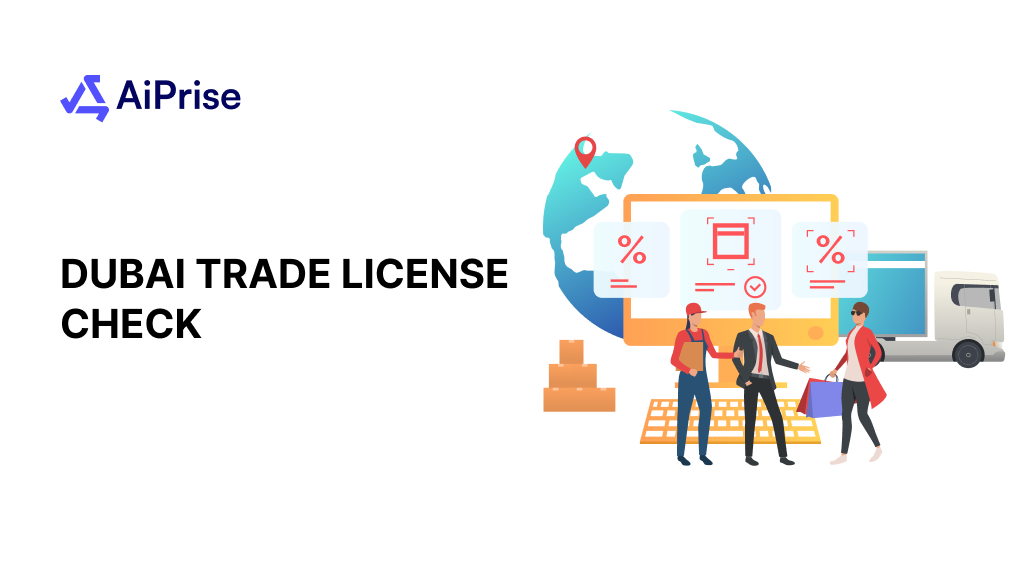AiPrise
9 min read
March 26, 2025
How To Do Business Verification in China?

Key Takeaways










China’s rapid economic growth has made it an indispensable player in global trade, with millions of businesses emerging across industries. However, this dynamic market also presents unique challenges: complex corporate structures, varying local regulations, and instances of fraudulent entities.
In fact, cases of shell companies and deceptive practices have been reported in high-growth sectors, highlighting the need for thorough due diligence.
For businesses entering partnerships in China, KYB (Know Your Business) is more than a compliance requirement—it’s a critical tool for safeguarding investments and ensuring sustainable growth in this high-stakes market.
Let’s dive into the ins and outs of doing KYB in China.
Definition and Importance of KYB
Know Your Business (KYB) refers to verifying the legitimacy and trustworthiness of business entities. This process includes scrutinizing company registrations, understanding ownership hierarchies, and assessing compliance records.
In China, where market opportunities are vast but regulatory landscapes complex, a robust KYB process protects businesses from fraud, reputational damage, and financial loss.
The Relevance of KYB in the Chinese Business Environment
China’s intricate regulatory systems and diverse regional laws can make business transparency challenging for foreign entities. KYB, in this context, helps companies:
- Navigate local regulations effectively.
- Identify risks associated with complex ownership structures.
- Build partnerships rooted in trust and accountability.
Regulatory Framework in China
China’s regulatory landscape places a strong emphasis on anti-money laundering (AML) and business verification to combat financial crimes and ensure market integrity. The People’s Republic of China (PRC) has implemented strict rules that require financial institutions and businesses to perform due diligence on their partners and clients.
These regulations are part of broader efforts to align with international standards set by the Financial Action Task Force (FATF).
Key AML and KYB regulations in China include:
- The Anti-Money Laundering Law of the PRC: Mandates financial institutions to perform due diligence on clients and report suspicious transactions.
- The Corporate Credit System: A centralized platform for monitoring the creditworthiness and compliance of Chinese companies.
- Provisions on Strengthening the Administration of Client Identity Verification: Enforces the identification and verification of business entities in financial transactions.
Key Regulatory Bodies Overseeing Business Compliance
The following table highlights the primary regulatory authorities responsible for enforcing KYB-related regulations in China:

Understanding the regulatory framework is the foundation for conducting KYB in China. With this context in mind, let’s explore the key components of an effective KYB process in the Chinese business environment.
Key Components of KYB in China
Successfully conducting KYB in China involves three essential steps:
Business Verification Processes
Business verification involves confirming the legitimacy of an entity by verifying its registration details, license authenticity, and operational status. In China, this often includes:
- Cross-checking business registration numbers with official databases like the SAMR.
- Reviewing corporate documentation, such as the business license and articles of association.
- Confirming the entity’s legal representative, address, and scope of operations.
Identifying Ultimate Beneficial Owners (UBOs)
Determining the ultimate beneficial owners (UBOs) is a critical aspect of KYB. In China, corporate ownership structures can be complex, with multiple layers of subsidiaries and shareholders. Identifying UBOs requires:
- Tracing the ownership hierarchy to pinpoint individuals who hold significant control (typically 25% or more).
- Using platforms like the National Enterprise Credit Information Publicity System to access shareholding details.
Continuous Monitoring and Due Diligence
KYB isn’t a one-time process; it requires ongoing monitoring to identify changes in a business partner’s compliance status. This includes:
- Regularly updating information from Chinese business registries.
- Monitoring for changes in ownership, legal disputes, or financial status.
- Staying informed about regulatory updates that may impact due diligence requirements.
Despite a clear process, conducting KYB in China comes with unique challenges due to its regulatory and cultural nuances. Let’s explore some of these challenges and how they can affect KYB efforts.
Challenges in Conducting KYB in China
Conducting KYB in China presents unique challenges that businesses must be prepared to address:
- Language and Documentation Barriers
Most official documents are in Mandarin, making accurate translation and understanding of legal terminology difficult for non-native speakers. - Access to Reliable Data Sources
Public registries like SAMR may have incomplete or outdated information, requiring additional verification efforts. - Complex Ownership Structures
Multi-layered corporate hierarchies can obscure UBOs, especially when involving subsidiaries, shell companies, or offshore entities.
Discover AiPrise’s UBO identification tools.
Overcoming these challenges requires a structured approach to KYB. Let’s look at a step-by-step guide to effectively conduct KYB in China.
Step-by-Step Guide to Conducting KYB in China
Conducting KYB in China requires a methodical approach to ensure accuracy and compliance. Here’s a step-by-step guide:
Step 1: Access Official Chinese Business Registries
Start by gathering verified information from authoritative sources like:
- State Administration for Market Regulation (SAMR): The primary registry for business licenses and corporate details.
- National Enterprise Credit Information Publicity System: Provides data on a company’s credit status, legal representatives, and operational compliance.
Step 2: Verify Business Licenses and Registration Details
Ensure the business partner has a valid and active business license. Key details to review include:
- Registration number.
- Legal representative’s name.
- Business scope and operational status.
Step 3: Confirm Ownership and Identify UBOs
Trace the ownership hierarchy to pinpoint the Ultimate Beneficial Owners (UBOs). This often involves:
- Reviewing shareholder information in public records.
- Using trusted platforms or verification tools to analyze ownership layers.
Step 4: Assess Financial Health and Compliance
Evaluate the company’s financial standing and compliance history by:
- Reviewing financial statements and credit reports.
- Checking for legal disputes, regulatory penalties, or operational issues.
Step 5: Monitor and Update Records Regularly
KYB is an ongoing process, not a one-time task. Establish a system for:
- Regularly checking for changes in business registration, ownership, or compliance status.
- Staying informed about updates in Chinese regulations that may impact due diligence.
Leveraging the right tools and resources can significantly streamline these steps. In the next section, we’ll explore how digital solutions and third-party services can enhance KYB processes in China.
Tools and Resources for Effective KYB
The following table highlights key tools and resources businesses can leverage for seamless KYB in China:

Utilizing these tools and resources ensures a robust KYB process in China. However, implementing them effectively requires adherence to best practices.
Let’s explore how to optimize your KYB efforts for long-term success.
Best Practices for Successful KYB Implementation
To ensure an effective and compliant KYB process in China, businesses should adopt the following best practices:
1. Establish a Standardized KYB Process
- Create a uniform framework for verifying business entities, including predefined steps for document collection, verification, and risk assessment.
- Use standardized checklists to ensure no critical steps are overlooked during the verification process.
2. Train Staff on Local Compliance Requirements
- Conduct regular training sessions to familiarize staff with Chinese regulations, including AML laws and UBO identification processes.
- Engage local compliance experts to address knowledge gaps and cultural nuances.
3. Leverage Technology for Efficiency
- Utilize digital platforms to automate repetitive tasks such as document verification, UBO tracing, and continuous monitoring.
- Opt for tools with built-in compliance features that align with Chinese regulations, such as AiPrise’s unified KYB platform.
4. Maintain Updated Records and Conduct Regular Reviews
- Establish a schedule for periodic updates to ensure business partner information remains accurate and compliant.
- Perform annual or semi-annual reviews of KYB records to identify and address any changes or risks.
5. Collaborate with Reliable Local Partners
- Work with trusted third-party verification services or legal consultants with expertise in Chinese regulations.
- Partnering with local firms can help overcome language barriers, streamline documentation processes, and ensure regulatory compliance.
These best practices make your KYB a smooth and resistant-free process. With an updated record and collaboration with local partners, your business stays ahead of the curve.
Conclusion
Conducting KYB in China is essential for businesses to build trustworthy partnerships and remain compliant with local and international regulations. While the process can be challenging due to language barriers, complex ownership structures, and access to reliable data, following a structured approach and leveraging the right tools can make all the difference.
AiPrise offers a comprehensive platform designed to simplify KYB across global markets, including China. By integrating with over 100 data sources and providing real-time verification, AiPrise ensures businesses can confidently verify their partners while staying compliant with regulatory requirements.
Take the first step toward secure and seamless KYB in China. Schedule your demo today and see how AiPrise can transform your compliance process.
You might want to read these...

Aiprise has helped streamline our KYB (Know Your Business) flow in 100+ countries. No other tool comes close.





Speed Up Your Compliance by 10x
Automate your compliance processes with AiPrise and focus on growing your business.




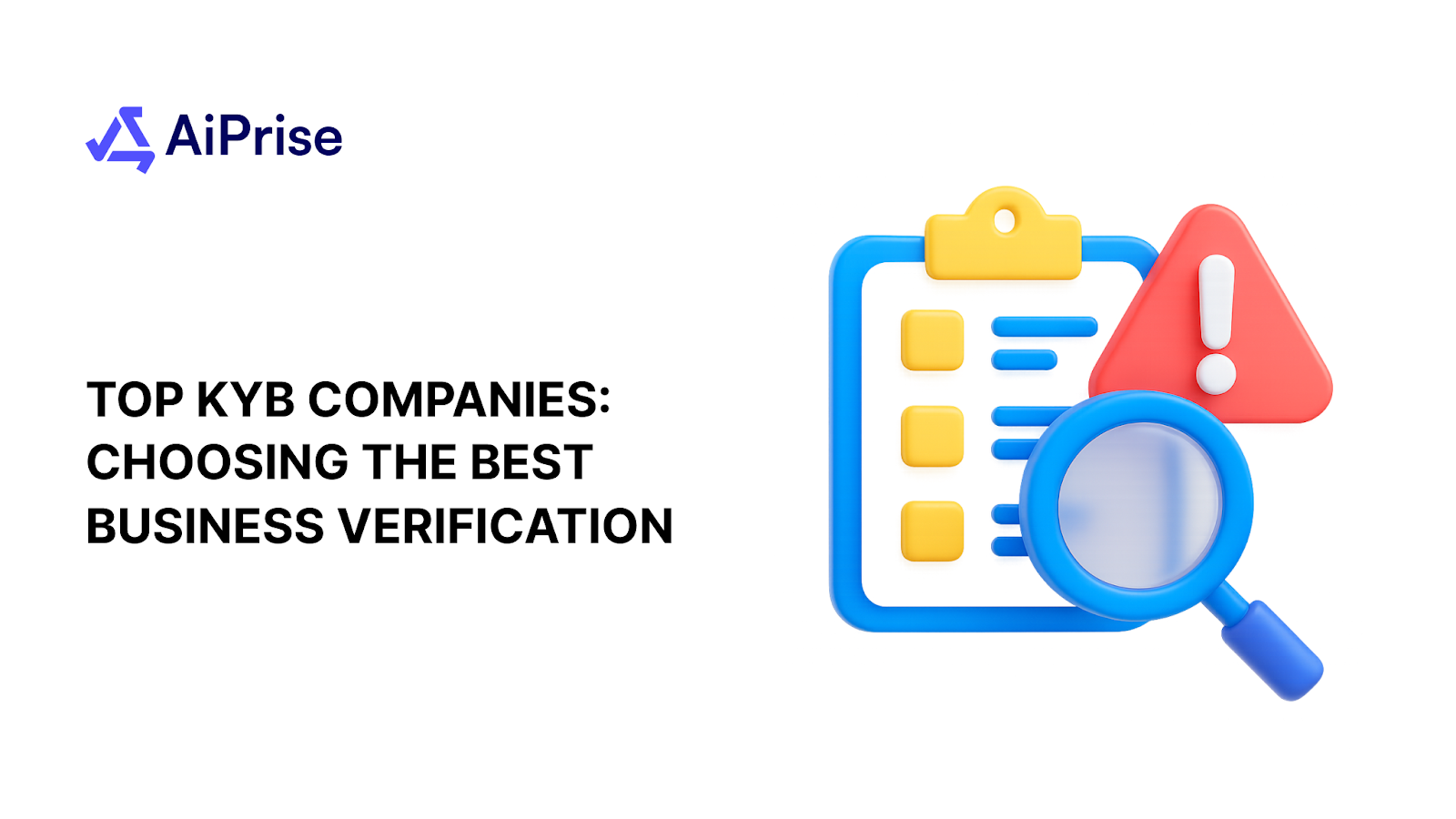
%20Can%20Improve%20Your%20Compliance%20Strategy.png)
